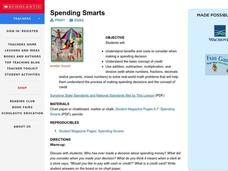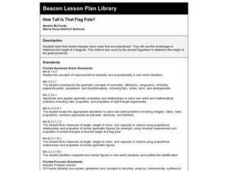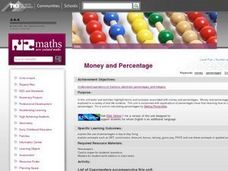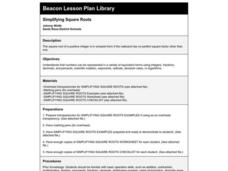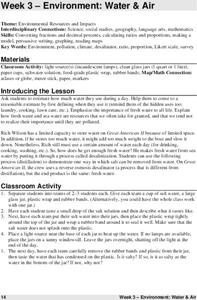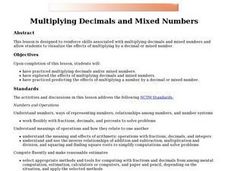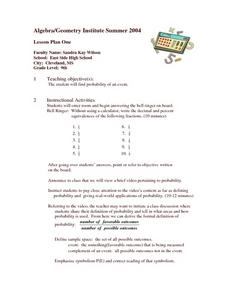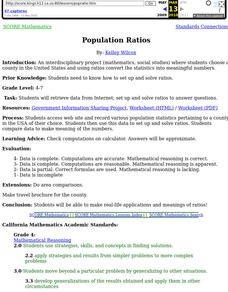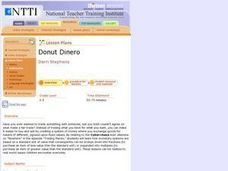Curated OER
Is the Price Right?
Students listen to the book, Arthur's Funny Money, then play The Price is Right game to estimate and to chart the price of items to the nearest $1.00 and $10.00. They check their estimates by counting out the actual amount in play money.
Curated OER
Spending Smarts
Students investigate the benefits and costs to consider when making a spending decision. They investigate the concept of credit, and use addition, subtraction, multiplication, and division to solve real-life math problems. They also...
Curated OER
Finding Remainders in Pascal's Triangle
Students use clock arithmetic to find remainders. In this patterns in math lesson, students explore the relationship between clock arithmetic and remainders using a computer applet. Students also identify patterns in Pascal's triangle...
Curated OER
Burning a Hole in Your Pocket
Students solve word problems. In this money lesson plan, students solve math word problems dealing with money and then write down all the steps necessary to solve the problems. Students use given websites to practice more...
Curated OER
Ratio Relationships
Learners solve for the different ratio and proportion of a problem. In this geometry lesson, students show their knowledge of how to solve proportional relationships. They convert between percent, decimals and fractions.
Curated OER
How Tall Is That Flag Pole?
Learners examine various triangles and discuss how similar triangles have sides that are proportional. They utilize an ancient Egyptian method to determine the height of a flagpole.
Curated OER
The Price Is Right - Grocery Store Prices
Eighth graders use the unit price to compare which local grocery store has the best prices. Assign students to work with a partner and a role. One person is the recorder and the other is the mathematician.
Curated OER
Working Watermelon
You're going to wish you had a watermelon for this lesson! Class members read about watermelons and make a salad in class to sample. They also perform estimates, measurements and calculations on a watermelon. They predict what percentage...
Curated OER
The Mystery of the Accelerating Race Car
Pupils define and discuss acceleration and how to compute acceleration. They observe examples of computing acceleration, and complete a worksheet using the correct formula.
Curated OER
Patterns in Pascal's Triangle
Students examine the patterns that exist in Pascal's Triangle. They explore multiples and factors. Sudents use an applet to create and color the multiples in Pascal's Triangle.
Curated OER
Finding Patterns in Fractals
Students discover patterns and sequences. They use a website to explore patterns and fractals. Students share their discovery of fractals and their patterns with the class. They develop a list of patterns used in everyday life.
Curated OER
Money and Percentage
Fifth graders examine use of percentages in real world situations. They complete worksheet about using percentages after reviewing the concept. They look through newspapers to find examples of percentages used over the course of three...
Curated OER
The 3 R's of Common Denominators
Third graders are shown an alternative method of determining the lowest common denominator of two or more unequal denominators. They complete a worksheet.
Curated OER
Percentage Basics 1
In this math worksheet, learners learn how percentages relate to fractions by cutting out and studying 8 cards. The cards show a percentage, an illustration, and the fraction.
Curated OER
Fraction Conversion Bingo
Middle schoolers reinforce previous math lessons involving the relationships between fractions, decimals and percents.
Curated OER
Simplifying Square Roots
Discuss the definition for a simplified form for a square root. Middle schoolers analyze different forms of a square root, the Product Property of Square Roots, and complete a worksheet.
Curated OER
Environment: Water & Air
The introduction to the lesson mentions a sailor's limited capacity to store drinking water on his ship. Pupils then set up an overnight experiment to remove freshwater from salt water by distillation. There is a math and map activity to...
Curated OER
Multiplying Decimals and Mixed Numbers
Young scholars multiply decimals and/or mixed numbers. They explore the effects of multiplying decimals and mixed numbers. They practice estimating answers when a number is multiplied by a decimal or mixed number.
Curated OER
Cutting the Wood
Students demonstrate and describe the effect of multiplying or dividing by a fraction less than or greater than one. They create and explain a variety of equivalent ratios that represent a given situation. Students draw a picture of...
Curated OER
Finding the Probability
Ninth graders investigate the concept of probability. They use a clear objective that is a visual cue for what is required for the lesson. They apply the basic practices of probability to real life like situations.
Curated OER
Sea Ice: Unscrambling the Egg Code
Students determine sea ice thickness, concentration, and floe size by reading egg codes. In this sea ice conditions lesson, students color code a map based on prescribed criteria and use the maps to identify changes in sea ice...
Curated OER
Population Ratios
Students access web site and record various population statistics pertaining to a county in the USA of their choice. They use this data to set up and solve ratios. They compare data to make meaning of the numbers.
Curated OER
Donut Dinero
Students set up a classroom currency exchange and explore the idea of bartering to get what they want. They create a monetary unit that is based on fractions and multiples of a standard unit, and compare this system to the U.S. monetary...
Curated OER
One Size Fits All, Part 1
Can you tell how tall someone is just by looking at their feet? In this activity, young mathematicians measure their height, arm span, and foot size, graph their findings, and answer questions about how these measurements are related....



